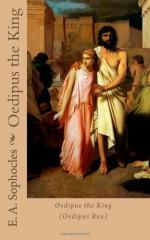|
This section contains 276 words (approx. 1 page at 300 words per page) |
Oedipus
I believe one of Sophocles' messages is that life is unfair and unjust. Sight/blindness goes along with this because at the end of the story when Oedipus becomes a hero he also becomes blind. It's also unfair the hand Oedipus was dealt in life. The fate he was told is brutal, and the fact that he even tries to get away from who he thinks is his biological father, but ends up killing his real father is an awful break. Oedipus couldn't control his fate, and that in itself is unjust. This connects back to sight/blindness because Oedipus matured throughout the story, only to end up without his eyesight. Oedipus driving onward after he is blinded and in deep pain, "No wonder you suffer twice over, the pain of your wounds, the lasting grief of pain," shows his true heroism.
Due to Oedipus' injustices, sight/blindness are great examples of both literal and metaphoric opposing motives in Oedipus Rex. Sophocles' central author purpose illustrates how unjust and unfair life can be, while making ironic situations such as Oedipus' metaphoric blindness maturing into literal blindness.
|
This section contains 276 words (approx. 1 page at 300 words per page) |


